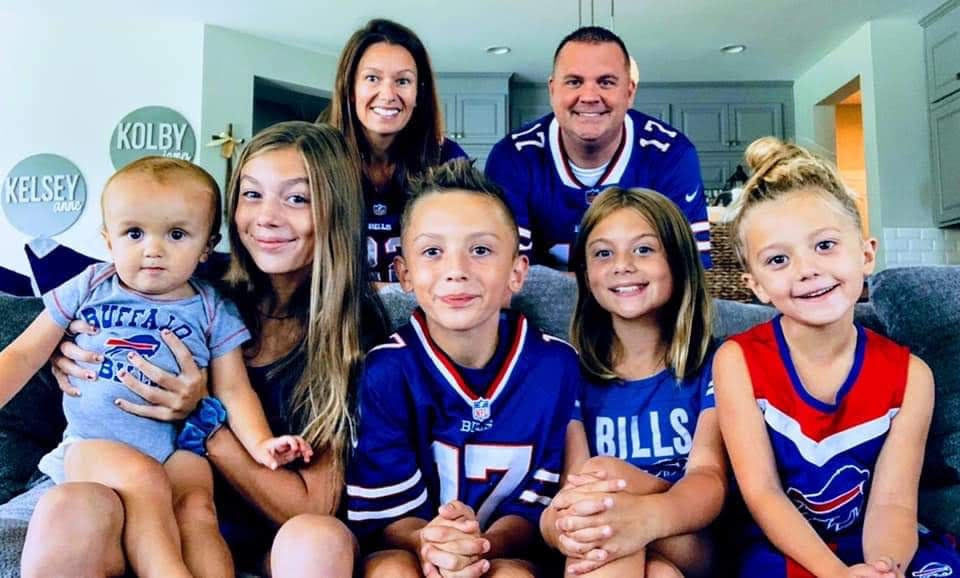Husband likes Biden, wife likes Trump; this election has tested the state of their union

FAYETTEVILLE, N.C. — At a party several years ago, Terry Long overheard something unsettling.
“Terry doesn’t know this,” his wife, Regan, said to a friend, “but I voted for Romney.”
He was a life-long Democrat and believed Regan was too, one who wouldn't support a Republican presidential nominee. Yet ever since the Romney revelation, the North Carolina couple has lived openly in a politically divided marriage.
This election, he has a "Biden" magnet on his car and she sports a "Trump" magnet on hers. Each champions their views in lengthy Facebook posts. He donated to the Biden campaign, which Regan only discovered upon examining their bank statement.
“He knew I never would have consented,” she said.
Regan, an author, sees a pro-life stance as a prerequisite for any candidate she supports. Terry, a health information consultant, is also pro-life — but considers abortion a piece of a broader policy puzzle.
The couple admits their 15-year relationship would benefit if they could stick to moratoriums on discussing the campaigns.
“We have an agreement every day, ‘We're not talking politics. We’re not talking politics,’” Terry said. “But I’m just as guilty as her of bringing it up.”
As their five children have developed political awareness, they too have picked sides — with the Longs' three daughters supporting mom’s politics while their oldest son sides with dad. At 16 months, their youngest remains apolitical.
And even when they refrain from broaching politics among themselves, Terry and Regan must still contend with extended family members who hold a dizzying mix of Democratic and Republican allegiances and a penchant for arguing.
This election, millions of Americans are voting, and millions of Americans are quarreling over who others should support. Some happen to be related. While this isn’t new — the troupe of an opinionated uncle at the Thanksgiving table does exist for a reason — the fallout families face over these differences has worsened as the discourse around modern American politics has intensified.
“It’s bad right now,” said Terry, who has cut off contact with certain friends and family over politics this year. “We might have disagreed on policy in the past, but with this specific election, I think it’s more about morality than it is about policy.”
'A lot of chaos': Trump's rhetoric, a global pandemic and a tsunami of lawsuits complicate 2020 election
More:Over 50 million people have already voted. Here's how that compares with past elections.
The apple can fall far from the tree
While opposites can attract, it’s rare for married couples to hold completely clashing views on politics, said Arielle Kuperberg, a sociology professor at the University of North Carolina at Greensboro.
“The couples that are politically different, they have so many arguments that they break up before they even get to marriage at a higher rate,” she said.
Kuperberg, whose research focuses on millennials, said it’s more common for familial political conflicts to be intergenerational.
“Young adults today are growing up in a much different context than their parents were growing up in,” she said.
A byproduct of the rapid social change seen in the 21st century, Kuperberg said, is that generations now have fewer shared experiences with other age groups, resulting in more disparate politics.
Half of all Americans are now millennials or younger. Baby boomers still constitute the largest slice of the electorate, but a higher percentage of eligible voters are members of Generation Z and millennials — all under 39. Younger generations are more diverse and put greater value on issues around immigration, criminal justice and the environment. Polls show most millennials, and even more Gen Z voters, disapprove of President Donald Trump.
One of these millennials is Rob Walsh, an Asheville resident in his late 30s whose father, in Walsh’s words, “lives and dies on the hill of Trump.”
“I recognize that he helped make me who I am, and I would never change anything about that,” Walsh said of his father. “But at the end of the day, we both know that talking about politics with his hard line in the sand is impossible.”
Instead of bringing up politics, and invariably seeing the conversation devolve into a muddle of arguments, counterarguments, and claims of “Fake News”, Walsh enjoys talking to his father about their shared love of music.
Avoiding the conflict-rich terrain of modern politics is a recommended tactic for those who want to enjoy their time with family and friends.
Conflict resolution scholars identify five forms of conflict resolution: collaborating, competing, accommodating, compromising, and avoiding. Most people address conflicts by avoiding them, said Sherrill Hayes, who teaches conflict management at Kennesaw State University outside of Atlanta.
“Sometimes I think it’s OK for people to avoid,” he said. “If you’re avoiding a problem now, you might be able to better engage with it later. Like if you’re really, really angry, it might be better to take a pause.”
Yet sometimes relatives can’t sidestep their political differences.
Holly Johnson, 42, has long been at odds with her parents’ conservative political beliefs. In recent years, these differences created a starker schism, as Johnson’s son came out as gay.
“Since the Obama administration, it took a turn,” she said. “Over the last four years, it’s gotten almost hostile, and we are now officially at the point where we can’t even communicate.”
Withstanding their differences
Terry and Regan Long have plenty in common.
Since meeting in college, they’ve constructed a life together, sharing goals — like having a big family and traveling — while focusing on their children and faith. They chauffeur their kids to sports practice, juggle homeschooling duties and work from home. Devout Catholics, they each pray daily and attend church weekly.
“We feel our lives move 75 mph, 24/7,” Regan said. “Those are a lot of things that keep us knitted together.”

Still, the 2020 Election has strained their relationship with higher-decibel exchanges, as neither take the stakes of modern politics lightly.
Regan believes abortion is an unconscionable act. Terry believes Trump is an unconscionable person. Their marriage is strong enough to withstand the weight of these intimate emotions, but some of their friendships have succumbed to the pressure.
Terry said he used to debate politics with people and then go grab a beer with no lingering ill will, as if they were just squabbling over his beloved Buffalo Bills and a rival football team. Now, he can’t help but hold resentment whenever someone voices support for the president.
“I feel like I’m cutting a lot of people out of my circle in this specific election just because I’m just so shocked that people that I’m very close with and I care about can support our current president,” he said.
Through Facebook, they’ve heard from other couples like them, half Democrat and half Republican, who extol establishing rules that limit intermarriage political discussions.
But knowing each other well, and knowing how well they'd follow such rules, Regan and Terry instead just wait, with anticipation, for this election to be over.
Follow Brian Gordon on Twitter @briansamuel92.
This article originally appeared on The Fayetteville Observer: Families split over 2020 Election, Biden, Trump, Republicans and Dems

